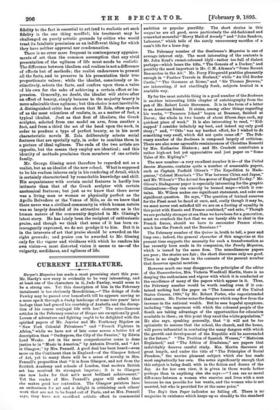However much one may disapprove the principles of the editor
of the Humanitarian, Mrs. Victoria Woodhull Martin, there is no. denying the enthusiasm and vigour with which it is conducted or the excellence of many of the papers which appear in it. Thus, the February number would be worth reading even if it con- tained nothing but the paper on "The Lessons of the United States Census, 1890," by Mr. Robert Porter, who superintended that census. Mr. Porter notes the dangers which may flow from the increase in the national wealth. But he sees hopeful symptoms, including "the eagerness with which the coloured people of the South are taking advantage of the opportunities for education available to them ; on this point they excel the white population." He also says, speaking generally, that "it will not be too optimistic to assume that the school, the church, and the home, will prove influential in combating the many dangers with which the growth and development of the Republic will be surrounded in the future." "The Position of Spanish Women," "Matteism Explained," and "The Ethics of Hinduism," are papers that indubitably deserve careful study. Mrs. Martin discusses at great length, and under the title of "The Principles of Social Freedom," the nowise pleasant subject which she has made most emphatically her own. She notes significantly enough that this subject is being dealt with in the fiction and drama of the day. As for her own view, it is givea in these words better perhaps than in anything else she says :—" I can see no moral difference between a woman who marries and lives with a man because he can provide for her wants, and the woman who is not married, but who is provided for at the same price."






































 Previous page
Previous page